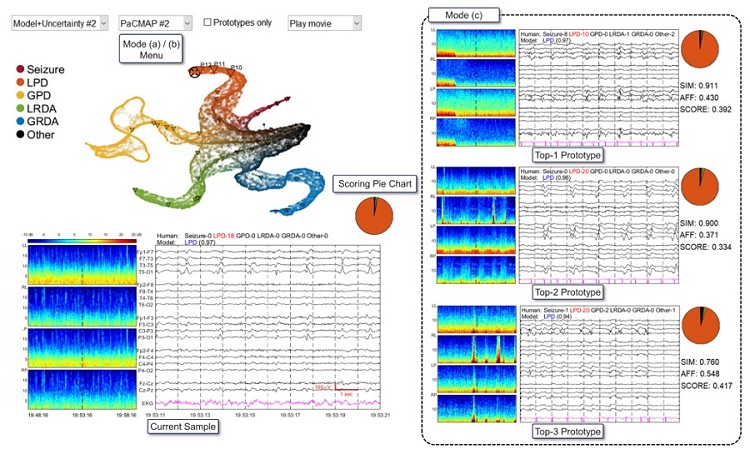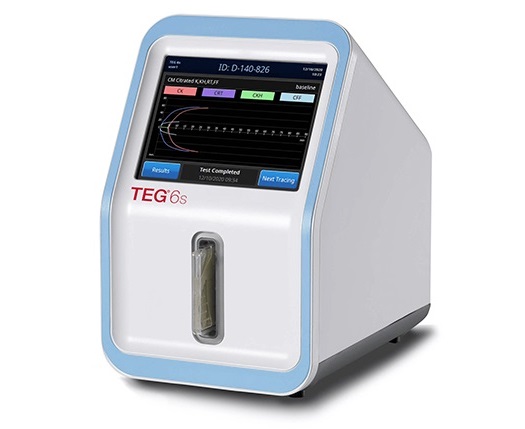Expandable Arterial Stent Helps Treat Iliac Stenosis
|
By HospiMedica International staff writers Posted on 03 Jun 2014 |

Image: The Visi-Pro balloon-expandable stent system (Photo courtesy of Covidien).
A balloon-expandable stent system helps patients regain blood flow by treating lesions of the common and external iliac arteries.
The Visi-Pro balloon-expandable stent system is intended to improve and maintain artery luminal diameter in occlusions or lesions at high risk for abrupt closure following percutaneous transluminal angioplasty (PTA), or in lesions believed to be at high risk of stenosis following PTA in the common and external iliac, subbclavian, and renal arteries. The stent is also indicated for use as a palliative treatment of malignant neoplasms in the biliary tree.
The Visi-Pro is made from a 316L stainless steel tube with a diameter of 0.9 mm cut into an open lattice design; tantalum radiopaque markers are placed at the proximal and distal ends of the stent for guided placement. For delivery, the stent is mounted onto a tightly-folded balloon catheter, and then expanded and deployed by inflating the balloon. Other features include solid radial strength, flexibility, superior trackability, and a unique 5-fold balloon wrap that improves retraction.
In a prospective, multicenter, nonrandomized study that enrolled 75 patients at 17 centers in the United States and Europe, The Visi-Pro met its primary nine month endpoint, with a major adverse event rate of just 4%. Additionally, the technology achieved 100% device success, with primary patency and freedom from clinically-driven target lesion revascularization at nine months at 95.8%. The Visi-Pro is a product of Covidien (Dublin, Ireland), and has received the European Community CE marking of approval.
“The nine month results were positive, demonstrating the effectiveness of the technology in treating patients with iliac disease, regardless of gender, lesion location, or severity,” said lead author John Rundback, MD, of the Holy Name Medical Center (Teaneck, NJ, USA). “A unique benefit of the Visi-Pro stent is its excellent visibility during deployment, which optimizes precise positioning and minimizes the risk of geographic miss that is inherent to iliac stent procedures.”
Related Links:
Covidien
Holy Name Medical
The Visi-Pro balloon-expandable stent system is intended to improve and maintain artery luminal diameter in occlusions or lesions at high risk for abrupt closure following percutaneous transluminal angioplasty (PTA), or in lesions believed to be at high risk of stenosis following PTA in the common and external iliac, subbclavian, and renal arteries. The stent is also indicated for use as a palliative treatment of malignant neoplasms in the biliary tree.
The Visi-Pro is made from a 316L stainless steel tube with a diameter of 0.9 mm cut into an open lattice design; tantalum radiopaque markers are placed at the proximal and distal ends of the stent for guided placement. For delivery, the stent is mounted onto a tightly-folded balloon catheter, and then expanded and deployed by inflating the balloon. Other features include solid radial strength, flexibility, superior trackability, and a unique 5-fold balloon wrap that improves retraction.
In a prospective, multicenter, nonrandomized study that enrolled 75 patients at 17 centers in the United States and Europe, The Visi-Pro met its primary nine month endpoint, with a major adverse event rate of just 4%. Additionally, the technology achieved 100% device success, with primary patency and freedom from clinically-driven target lesion revascularization at nine months at 95.8%. The Visi-Pro is a product of Covidien (Dublin, Ireland), and has received the European Community CE marking of approval.
“The nine month results were positive, demonstrating the effectiveness of the technology in treating patients with iliac disease, regardless of gender, lesion location, or severity,” said lead author John Rundback, MD, of the Holy Name Medical Center (Teaneck, NJ, USA). “A unique benefit of the Visi-Pro stent is its excellent visibility during deployment, which optimizes precise positioning and minimizes the risk of geographic miss that is inherent to iliac stent procedures.”
Related Links:
Covidien
Holy Name Medical
Latest Surgical Techniques News
- Study Warns Against Dangerous Smoke Levels Produced During Endoscopic Gastrointestinal Procedures
- New Hydrogel Sealant Effective at Sealing Dural Defects and Preventing Postoperative Adhesion
- MRI-Guided Multi-Stage Robotic Positioner Enhances Stereotactic Neurosurgery Precision

- AR Visualization System Improves Surgeons’ Capabilities and Spatial Awareness
- New Adhesive Hydrogel Coatings to Prolong Lifespan of Pacemakers and Medical Implants
- Maneuvering System Empowers Surgeons with Enhanced Control during Laparoscopic Procedures
- New Two-Dimensional Material Paves Way for Safer, More Effective Implantable Medical Devices
- Portable MRI Compatible Surgical Robot Improves Patients Outcomes for Neurosurgery
- World-First Device to Remove Bacterial Biofilm Inside Endoscopes
- Minimally Invasive Imaging Technique to Revolutionize Ureteral Injury Detection
- Modular Communicative Leadless ICD Proves Safe and Exceeds Performance Expectations
- AR Surgical Technology Translates Complex 2D Medical Imaging to Enhance Accuracy
- Miniaturized Snake-Like Probe Images Cerebral Arteries From Within
- Miniaturized Implantable Multi-Sensors Device to Monitor Vessels Health
- Tiny Robots Made Out Of Carbon Could Conduct Colonoscopy, Pelvic Exam or Blood Test
- Miniaturized Ultrasonic Scalpel Enables Faster and Safer Robotic-Assisted Surgery
Channels
Artificial Intelligence
view channel
AI-Powered Algorithm to Revolutionize Detection of Atrial Fibrillation
Atrial fibrillation (AFib), a condition characterized by an irregular and often rapid heart rate, is linked to increased risks of stroke and heart failure. This is because the irregular heartbeat in AFib... Read more
AI Diagnostic Tool Accurately Detects Valvular Disorders Often Missed by Doctors
Doctors generally use stethoscopes to listen for the characteristic lub-dub sounds made by heart valves opening and closing. They also listen for less prominent sounds that indicate problems with these valves.... Read moreCritical Care
view channel
AI Doubles Medical Professionals’ Accuracy in Reading EEG Charts of ICU Patients
Electroencephalography (EEG) readings are crucial for detecting when unconscious patients may be experiencing or are at risk of seizures. EEGs involve placing small sensors on the scalp to measure the... Read moreFlexible Device Enables Sweat Gland Stimulation and Simultaneous Biosensing
Human sweat is rich in biomarkers that can be used to monitor a range of health conditions, from diabetes to genetic disorders. Many users prefer sweat sampling over blood collection because it is painless.... Read more
WHO Publishes First Global Guidelines to Reduce Bloodstream Infections from Catheter Use
Up to 70% of all inpatients require a catheter, specifically a peripherally inserted catheter (PIVC), at some point during their hospital stay. Patients who receive treatments via catheters are particularly... Read morePatient Care
view channelFirst-Of-Its-Kind Portable Germicidal Light Technology Disinfects High-Touch Clinical Surfaces in Seconds
Reducing healthcare-acquired infections (HAIs) remains a pressing issue within global healthcare systems. In the United States alone, 1.7 million patients contract HAIs annually, leading to approximately... Read more
Surgical Capacity Optimization Solution Helps Hospitals Boost OR Utilization
An innovative solution has the capability to transform surgical capacity utilization by targeting the root cause of surgical block time inefficiencies. Fujitsu Limited’s (Tokyo, Japan) Surgical Capacity... Read more
Game-Changing Innovation in Surgical Instrument Sterilization Significantly Improves OR Throughput
A groundbreaking innovation enables hospitals to significantly improve instrument processing time and throughput in operating rooms (ORs) and sterile processing departments. Turbett Surgical, Inc.... Read moreHealth IT
view channel
Machine Learning Model Improves Mortality Risk Prediction for Cardiac Surgery Patients
Machine learning algorithms have been deployed to create predictive models in various medical fields, with some demonstrating improved outcomes compared to their standard-of-care counterparts.... Read more
Strategic Collaboration to Develop and Integrate Generative AI into Healthcare
Top industry experts have underscored the immediate requirement for healthcare systems and hospitals to respond to severe cost and margin pressures. Close to half of U.S. hospitals ended 2022 in the red... Read more
AI-Enabled Operating Rooms Solution Helps Hospitals Maximize Utilization and Unlock Capacity
For healthcare organizations, optimizing operating room (OR) utilization during prime time hours is a complex challenge. Surgeons and clinics face difficulties in finding available slots for booking cases,... Read more
AI Predicts Pancreatic Cancer Three Years before Diagnosis from Patients’ Medical Records
Screening for common cancers like breast, cervix, and prostate cancer relies on relatively simple and highly effective techniques, such as mammograms, Pap smears, and blood tests. These methods have revolutionized... Read morePoint of Care
view channel
POCT for Infectious Diseases Delivers Laboratory Equivalent Pathology Results
On-site pathology tests for infectious diseases in rural and remote locations can achieve the same level of reliability and accuracy as those conducted in hospital laboratories, a recent study suggests.... Read more
Cartridge-Based Hemostasis Analyzer System Enables Faster Coagulation Testing
Quickly assessing a patient's total hemostasis status can be critical to influencing clinical outcomes and using blood products. Haemonetics Corporation (Boston, MA, USA) has now obtained 510(k) clearance... Read more
Critical Bleeding Management System to Help Hospitals Further Standardize Viscoelastic Testing
Surgical procedures are often accompanied by significant blood loss and the subsequent high likelihood of the need for allogeneic blood transfusions. These transfusions, while critical, are linked to various... Read moreBusiness
view channel
MEDICA INNOVATION FORUM for the Healthcare Innovations of the Future
By always offering innovations and updating existing program formats, the internationally leading medical trade fair MEDICA in Düsseldorf has been successful for over half a century and always gives its... Read more















